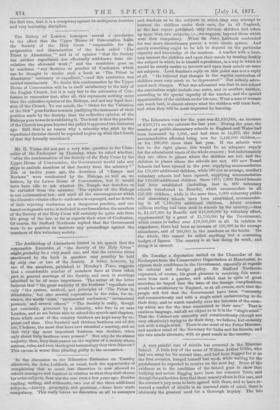In the discussion on the Education Estimates on Tuesday afternoon,
Sir John Lubbock, as usual, took the opportunity of complaining that so much less discretion is now allowed to school-managers and teachers in relation to what they shall choose for extra subjects, than was the case even a few years ago. Besides reading, writing, and arithmetic, two out of the three additional subjects,—history, geography, and grammar,—have been made compulsory. This really leaves no discretion at all to managers
and teachers as to the subjects in which they may attempt to interest the children under their care, for in all England, in the last report published, only thirteen children had taken up more than two subjects, i.e., we suppose, beyond those which were then compulsory. What Sir John Lubbock contended for was more discretionary power, a more elastic system. And surely something ought to be left to depend on the particular capacity and knowledge of the teachers. A teacher with a bent, may interest the children and open their minds by treating freshly the subject in which he is himself a proficient, in a way in which he would be utterly unable to interest and open their minds on mere set subjects. Lord Sandon's reply on this point was not a reply at all. "lie believed that changes in the regular curriculum of children were very much to be deprecated." But nobody advo- cated such changes. What was advocated was that in one school the curriculum might include one extra, and in another, another, according to the special capacity of the teacher, and the special opportunities of the children under his care. What a man or woman can teach best, is almost always what the children will learn best, and what they will be most improved by learning.


































 Previous page
Previous page